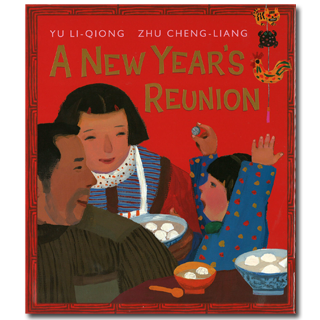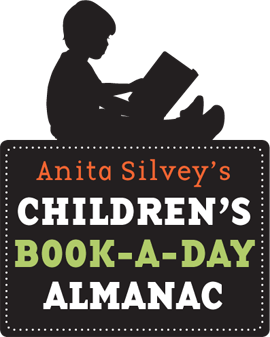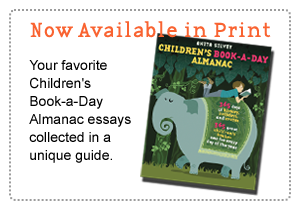
A FEW OTHER EVENTS FOR
JANUARY 23:
- It’s the birth date of John Hancock (1737–1793), signer of the U.S. Declaration of Independence and the first governor of Massachusetts. On a related note, it’s National Handwriting Day.
- Elizabeth Blackwell is awarded her M.D. in 1849, by the Medical Institute of Geneva, New York, becoming the United States' first female doctor. Read Doctor Meow’s Big Emergency by Sam Lloyd.
- One this day in1973 President Richard Nixon announces a peace accord has been reached in Vietnam. Read Vietnam: A Traveler’s Literary Companion edited by John Balaban and Nguyen Qui Duc.
- It’s National Pie Day. Read How to Make an Apple Pie and See the World by Marjorie Priceman.
Today begins the Chinese New Year, the Year of the Dragon. Certainly over the years many American publishers have offered titles appropriate for this holiday. But a few months ago, a book that first appeared in Taiwan in 2008 was released and it’s one of the finest I have ever seen.
A New Year’s Reunion by Li Qiong Yu and illustrated by Zhu Chen Liang immediately provides some cultural perspective. A young girl, Maomao, and her mother wake up early because Papa is coming home for the New Year. Because he builds houses in far away places, the family only comes together for New Year celebrations. The story follows the actions of the family during the blessed reunion: Papa gets shaved so he looks familiar to his daughter; he gives them presents. And then the family makes sticky rice balls for the celebration. They enjoy fireworks and go out to celebrate the New Year. Papa gets busy around his own house, fixing items. Together the girl and her father watch the Dragon Dance from their rooftop. And then Papa must leave, not to return for another year. “Daddy is very quiet. He nods and hugs me tight.”
In a book that combines celebration and sadness in equal measure, the story presents both the customs of the New Year and the plight of families separated because of economic considerations. Cheng-Liang’s gouache paintings brilliantly capture the vibrant street scenes and the energy of the Dragon Dance. But juxtaposed against these broad views, he brings us up close to see intimate portraits of the family members. And the final scene, with only backs of the mother and girl showing while a truck drives off, provides an appropriate emotional moment for the ending of the story.
An author’s note says simply, “The family in the book is a fictional one, but there are in reality over 100 million migrant workers in China, many of whom work hundreds or sometimes thousands of miles away from home, returning only once each year, for just a few days, at New Years.” Not only does the book extend our awareness of conditions in China, it naturally raises a discussion about the sacrifices of American military families and other migrant workers. Winner last year of a New York Times Ten Best Illustrated Books, A New Year’s Reunion works on so many levels—a celebration, an exploration of love and family, a commentary on social conditions. Yet, it can still simply be enjoyed as a simple picture book that celebrates a family’s coming together.
For anyone who wants to mark the Chinese New Year, make this your first purchase. Happy Year of the Dragon.
Here’s a page from A New Year’s Reunion:
Originally posted January 23, 2012. Updated for 2024.














oh, Anita, this is beautiful! And thank you for mentioning how it could be used for showing other kinds of families that live apart…one of the projects I’m working on (sidelines) is book lists of books for military families, as well as families that live outside their “passport” culture. This book looks amazing, I’ll look for it tomorrow at work.
(I’ll have to look again for Scaredy Squirrel, I was too exhausted the other day to go over to the stacks. Now that’s the kind of tired that needs a remedy!!)
What a wonderful book. Thank you for sharing this!! Gung Hay Fat Choy!
This seems such a very special work, and until I read Anita’s review here, it never occurred to me there were people who were forced to stay away from family and friends for a year, or years, just to support a family.
I find the concept deeply disturbing, and the whole thing fills me with overwhelming compassion not only for these people, but for someone else who shall remain nameless. (If I were a Time Lord, I’d fix that. Wait! Perhaps an author can be a kind of Time Lord.)
It should be known there are lone travelers through childhood who had no idea there were others, let alone huge numbers of others, who faced this kind of thing, just as they did, even if due to a different cultural concept. Being alone without family and friends for years, has the same impact for an individual, as it does for groups. The emotional cost can almost be unnamable. In fact, it may be many years, before you can give it a name.
If there is any consolation, perhaps the pain and resulting passion which such profound separations often produce, will, in some cases (I hope many) result in magnificent works of creativity that fill people with beauty and ecstasy for generations to come. I hope so.
Now to read the book..
I happened to read this book on the Chinese New Year by accident! It is absolutely stunning, and the story is wonderful and different. Thanks for highlighting it!